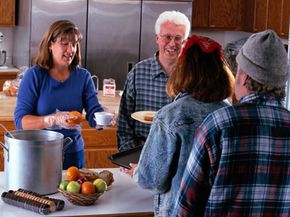Widespread volunteerism is an indicator of a healthy culture. A society in which people are willing to spend a few extra hours per week working to help their community for free means that its citizens have both leisure and goodwill to spare. But what if you want to take it to the next level? What if you want to turn a few hours of volunteer work every week into an occupation? And if that work becomes a full-time job, how do you maintain the volunteer spirit? Is it possible to become a professional volunteer?
That depends on how you define it. For instance, things get a little muddy once you start to consider people like teachers and firefighters, who are dedicating their lives to community service. Are they professional volunteers or just professionals? On the other hand, what if you're the princess of Monaco but also spend 60 hours a week reading aloud to the blind? What if you've chaired the Red Cross board of directors on Sunday afternoons for 35 years? Or you work as a fry cook but underreport your hours?
Advertisement
There's no formal definition for professional volunteerism, so picking out what it means can be a bit difficult. The word "professional" suggests that whatever you're doing, you're good at it and getting paid. But the term "volunteerism" almost always means that you're working for free. For the sake of convenience, we're going to try to walk the thin line and consider as a professional volunteer someone who devotes most of his or her life -- as much time as is allotted for any paid labor -- to the service of others for little or no compensation. A professional volunteer is willing to give up material comforts and financial stability in order to make the world a better place, even leaving friends and family to pick up and move to unfamiliar areas.
It's a noble course to take, but there are a few practical considerations. After all, you're going to have to pay for food and rent somehow. On the next page, we'll take a look at some of the logistics of being a professional volunteer.
Advertisement



